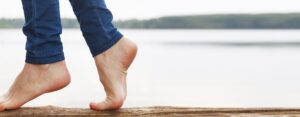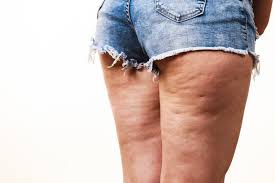Common problems in body care

Cracked heels and callouses on palms
Cracked heels are due to habitual lack of moisture. The skin on the heels is harder and thicker than other parts of the body. Loss of moisture causes keratinization, where living cells change to dead horny cells. If the lack of moisture proceeds unchecked, cracks develop. Sometimes, they can even be painful. Chlorinated or hard water can also cause dryness. Callouses form due to thickening of skin, caused by friction, usually over a bony area. It is a protective response of the skin. They can occur on the palms.
Avoid using metal instruments or scrubbers on cracked heels and callouses. For cracked heels, add coarse salt to hot water and soak the feet at night for 20 minutes. With a pumice stone or a heel scrubber, rub the heels gently. Wash feet and apply cream, massaging it into the skin. Then apply cream lavishly and tie clean cloth around the feet, like a bandage. Wear cotton socks and go to sleep. Do this daily for a week. If there is any pain or bleeding from cracks, consult a doctor.
For palm callouses, soak hands in warm water, after adding some Epsom salts. This helps to soften corns. You can also soak hands in diluted chamomile tea. Chamomile tea bags are available. You can also rub the callous gently with a pumice stone and then apply a softening cream. Or, you can ask your doctor for an antiseptic ointment. Dr.Suzanne Levine, a podiatrist, suggests crushing aspirin tablets and making a paste with water and lemon juice. Apply on the callous and then place a warm moist towel over it. Keep it on for ten minutes. Needless to say, in case of pain, consult a doctor.
If you have these problems, put your foot down with a firm hand and give them regular care!
Cellulite
Cellulite is not a disease or a disorder, but it can make a difference to the figure and cause a great deal of concern. It is a common problem of “lumps” that generally appear on the thighs, hips, buttocks, upper arms and even the upper back. Another term for cellulite is “orange peel skin”, because the skin on these areas resembles an orange peel. The problem of cellulite is more common in women.
Cellulite is caused by deposits of water, fat and other wastes that collect in pockets beneath the skin. The slowing down of the body’s waste removal process is thought to be responsible for the condition. In other words, there is a relationship between body toxicity and cellulite. The hardening of connective tissue is also involved, as this leads to the imprisonment of wastes, in lumps under the skin. Sluggish digestion, constipation, poor liver functioning, poor blood circulation, mental tension, chronic fatigue, insomnia and a sedentary lifestyle are some causative factors. In fact, one or more of these can undermine the normal functions of waste removal carried out by the kidneys, intestines, skin and lymphatic system.
The lymphatic system helps the body to get rid of toxic, metabolic and cellular wastes. The normal contraction and relaxation of muscles helps the system by providing necessary pumping for lymphatic circulation and drainage. Massage is an important part of the treatment, along with “skin brushing”. It is best to massage the area with cellulite when the muscles are relaxed. Long stroking movements, are used for stimulating blood and lymphatic flow. The area with cellulite is squeezed and kneaded, ending with the stroking movements again. A combination of oils of margosa (neem), winter cherry (ashwagandha) and sandalwood has been used, mixed with carrier oils of almond, olive and sesame seed, for treating cellulite.
Skin “brushing” helps the elimination of toxins. The entire surface, excluding the face, should be brushed, using a rough cloth, or a natural bristle brush. Begin from the feet and go upwards. Then brush from lower to upper arms. Go across the shoulders and back. Brush gently on the chest and abdomen.
Cellulite can be a stubborn condition and will not disappear overnight. A permanent change in diet and lifestyle is essential. A nutritious diet, regular exercise, relaxation and deep breathing also help to free those trapped wastes and drain them from the system.



